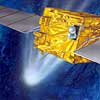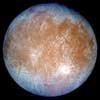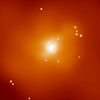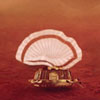|
Sunday:
October 27, 2002 | |
0001 GMT |
 |
Eavesdropping on ice
Forget drilling. A simpler and cheaper way to search for an ocean under Europa's glacial surface is to land a solitary electronic ear on the Jovian moon, and listen to the echoes of cracking ice, an acoustical oceanographer says.
 FULL STORY FULL STORY
 |  |

|
 |
Comet orbiter shipped to South American launch site
Twenty instruments on the European Space Agency's comet-chasing Rosetta spacecraft are in final tests for launch early next year. Launch will occur aboard an Ariane 5 from the Kourou spaceport in French Guiana, on the northeastern coast of South America.
 FULL STORY FULL STORY
 |  |

|
 |
|
Saturday:
October 26, 2002 | |
0257 GMT |
 |
Scientists boost tally of moons around Uranus
A new moon of the planet Uranus has been discovered and confirmed by a team of astronomers. This most-recently discovered natural satellite, named S/2001 U 1, brings the total number of confirmed uranian moons to 21.
 FULL STORY FULL STORY
 |  |

|
 |
Team studying water, ice and potential life on Europa
The oozing of glacial material in the floating ice shell on Jupiter's moon Europa has important implications for future exploration of the enigmatic moon and prospects of life in its ice-covered ocean, according to a University of Colorado at Boulder professor.
 FULL STORY FULL STORY
 |  |

|
 |
|
Friday:
October 25, 2002 | |
0057 GMT |
 |
Integral makes its first measurements
After a successfull launch on October 17, experts say that ESA's Integral spacecraft is in very good health, orbiting Earth. Some of the first data received clearly show the transits through the Earth's electron and proton radiation belts. Moreover, the optical monitor has provided a first-test image showing a region of sky in the Triangulus Australis constellation.
 FULL STORY FULL STORY
 |  |

|
 |
ESA's good-natured DevILS
The European Space Agency has started an initiative to bring together Europe's leading aerospace companies for the next four years. The aim of DevILS is to develop 'intelligent', lightweight spacecraft systems that ESA can use on future missions. Having these 'plug-and-play' systems will allow Europe to create lighter spacecraft that perform better.
 FULL STORY FULL STORY
 |  |

|
 |
|
Thursday:
October 24, 2002 | |
0105 GMT |
 |
New way of finding planets
A new extrasolar planet has been discovered using a new technique that will allow astronomers to detect planets no other current method can. Planets around other stars have been previously detected only by the effect they have on their parent star, limiting the observations to large, Jupiter-like planets and those in very tight orbits.
 FULL STORY FULL STORY
 |  |

|
 |
Texas astronomer watches as black hole eats a star
University of Texas-Austin graduate student Feng Ma didn't expect to see a black hole gobble up a star when he went out to McDonald Observatory to point a telescope at the next quasar on the list of about 60 he's studying. But that's what happened, he realized on later review of his observations.
 FULL STORY FULL STORY
 |  |

|
 |
NASA to develop biohazard 'smoke' detector
Researchers at NASA's Jet Propulsion Laboratory have demonstrated a prototype device that automatically and continuously monitors the air for the presence of bacterial spores. The result is a novel alarm capability reminiscent of smoke detectors.
 FULL STORY FULL STORY
 |  |

|
 |
|
Wednesday:
October 23, 2002 | |
0201 GMT |
 |
Dark matter reality check
New evidence from NASA's Chandra X-ray Observatory challenges an alternative theory of gravity that eliminates the need for dark matter. The observation also narrows the field for competing forms of dark matter, the elusive material thought to be the dominant form of matter in the universe.
 FULL STORY FULL STORY
 |  |

|
 |
Challenges of landing on alien worlds
Three ESA missions are due to send down robotic 'spaceprobes' when they arrive at their alien destinations. Since these craft will be going where no one has gone before, how can scientists be sure what it will be like down there? How do you ensure that your spaceprobe is prepared for anything?
 FULL STORY FULL STORY
 |  |

|
 |
Soyuz launch rescheduled
Russian space officials have set October 30 as the new launch date for the international space station's replacement Soyuz escape capsule and a three-man taxi crew. Liftoff had been planned for October 28 but was delayed in the wake of last week's Soyuz rocket disaster. Foreign debris in one of the rocket's engines is being blamed for the failure, which killed one person on the ground. For now, launch of shuttle Endeavour remains targeted for November 10, hours after the station's old Soyuz undocks to bring the taxi crew back to Earth.
 WORLDWIDE LAUNCH SCHEDULE WORLDWIDE LAUNCH SCHEDULE
 |  |

|
 |
|
Tuesday:
October 22, 2002 | |
0400 GMT |
 |
Work underway at Cape for first Air Force EELV launch
The first all-military Evolved Expendable Launch Vehicle mission is taking shape at Cape Canaveral Air Force Station with the arrival of the Boeing Delta 4 booster and Lockheed Martin-built defense communications satellite payload.
 FULL STORY FULL STORY
 |  |

|
 |
First redesigned Boeing 702 satellite goes to work
PanAmSat Corp. has assumed control of Galaxy 3C, the first Boeing 702 satellite to fly with an improved solar array design, after the spacecraft successfully completed all major mission milestones and in-orbit testing.
 FULL STORY FULL STORY
 |  |

|
 |
NASA researchers probe Mundrabilla meteorite
A new NASA study of a one-of-a-kind meteorite found 36 years ago in Australia could help provide the science community and industry with fundamental knowledge for use in the design of advanced materials.
 FULL STORY FULL STORY
 |  |

|
 |
|
Monday:
October 21, 2002 | |
0124 GMT |
 |
Surfing a black hole
An international team of astronomers, lead by researchers at the Max-Planck Institute for Extraterrestrial Physics (MPE), has directly observed an otherwise normal star orbiting the supermassive black hole at the center of the Milky Way Galaxy.
 FULL STORY FULL STORY
 |  |

|
 |


 This exceptional chronicle of the historic Apollo 11 lunar landing mission features new digital transfers of film and television coverage unmatched by any other.
This exceptional chronicle of the historic Apollo 11 lunar landing mission features new digital transfers of film and television coverage unmatched by any other.